The Personalized Immunotherapy Market is estimated to be valued at USD 11.2 billion in 2025 and is projected to reach USD 38.6 billion by 2035, registering a compound annual growth rate (CAGR) of 13.2% over the forecast period.
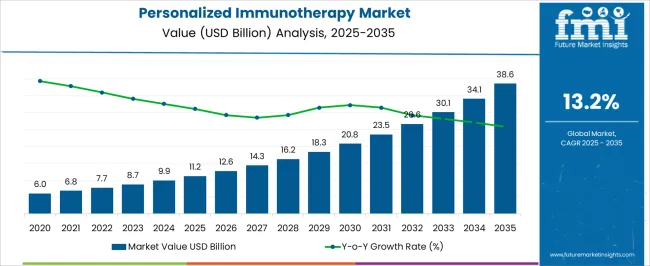
| Metric | Value |
|---|---|
| Personalized Immunotherapy Market Estimated Value in (2025 E) | USD 11.2 billion |
| Personalized Immunotherapy Market Forecast Value in (2035 F) | USD 38.6 billion |
| Forecast CAGR (2025 to 2035) | 13.2% |
The Personalized Immunotherapy market is witnessing strong growth, driven by the rising focus on individualized treatment approaches that leverage patients’ genetic and molecular profiles. The current market scenario is shaped by increasing adoption of targeted therapies that optimize treatment efficacy while minimizing adverse effects. Personalized immunotherapy is being increasingly preferred for cancers and chronic diseases, where traditional therapies have limited effectiveness.
Advancements in biotechnology, immuno-oncology, and molecular diagnostics have enabled the development of more precise therapies, resulting in improved patient outcomes. Rising awareness among patients and healthcare providers about the benefits of personalized treatment, coupled with expanding healthcare infrastructure and investment in clinical research, is further supporting market growth.
Additionally, regulatory approvals for novel therapies and the growing emphasis on patient-centered care models are expected to create significant opportunities for future expansion As precision medicine continues to advance, the Personalized Immunotherapy market is projected to experience sustained growth driven by innovation, clinical adoption, and increasing demand from both developed and emerging markets.
The personalized immunotherapy market is segmented by therapy type, application, distribution channel, and geographic regions. By therapy type, personalized immunotherapy market is divided into Monoclonal Antibodies, Non-Specific Immunotherapies, Cytokines, T-Cell Therapy, and Cancer Vaccines. In terms of application, personalized immunotherapy market is classified into Breast Cancer, Prostate Cancer, Brain Cancer, Leukemia, and Others. Based on distribution channel, personalized immunotherapy market is segmented into Hospital Pharmacies, Retail Pharmacies, and Drug Stores. Regionally, the personalized immunotherapy industry is classified into North America, Latin America, Western Europe, Eastern Europe, Balkan & Baltic Countries, Russia & Belarus, Central Asia, East Asia, South Asia & Pacific, and the Middle East & Africa.
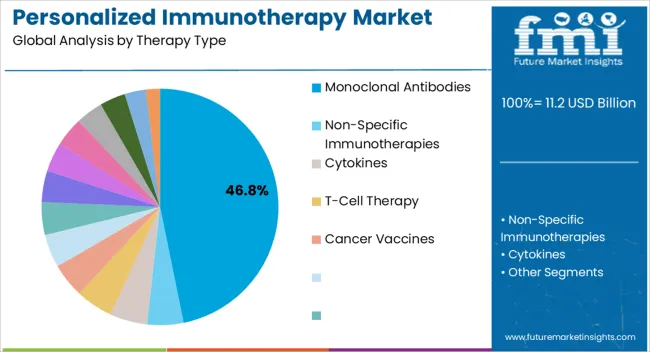
The Monoclonal Antibodies therapy type is projected to hold 46.80% of the Personalized Immunotherapy market revenue share in 2025, establishing it as the leading therapy type. This dominance is being attributed to the ability of monoclonal antibodies to selectively target specific antigens, enhancing efficacy while reducing off-target effects. The growth of this segment has been facilitated by significant clinical adoption across oncology, autoimmune disorders, and infectious disease treatments.
Monoclonal antibodies allow for the development of personalized treatment regimens that are adaptable to patient-specific molecular profiles. The segment has benefited from technological advances in antibody engineering, including humanized and bispecific antibodies, which improve safety and therapeutic outcomes. Furthermore, the scalability of production and compatibility with hospital-based infusion protocols have reinforced its widespread adoption.
The ability to integrate these therapies with companion diagnostics and real-time patient monitoring systems has also strengthened their position as the preferred immunotherapy modality As precision medicine becomes central to modern healthcare, monoclonal antibodies are expected to continue driving revenue in this market.
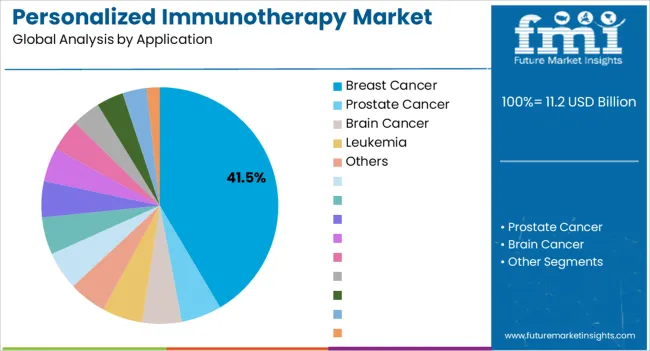
The Breast Cancer application segment is expected to account for 41.50% of Personalized Immunotherapy market revenue in 2025, making it the dominant application. This prominence is being driven by the high prevalence of breast cancer and the need for targeted, patient-specific therapies that improve survival rates and reduce recurrence. Personalized immunotherapy has been increasingly applied to breast cancer due to its capacity to address heterogeneity in tumor biology, allowing therapies to be tailored to molecular subtypes.
The integration of biomarker-based diagnostics and companion testing has enabled precise identification of eligible patients, enhancing treatment outcomes. Clinical adoption has been further supported by growing awareness among oncologists and patients regarding the advantages of individualized therapy, particularly in advanced and metastatic cases.
The segment’s growth has been reinforced by expanding access to treatment in hospital and clinical settings, coupled with regulatory approvals for novel immunotherapeutic options As research continues to uncover new molecular targets, breast cancer is expected to remain the leading application driving the Personalized Immunotherapy market.
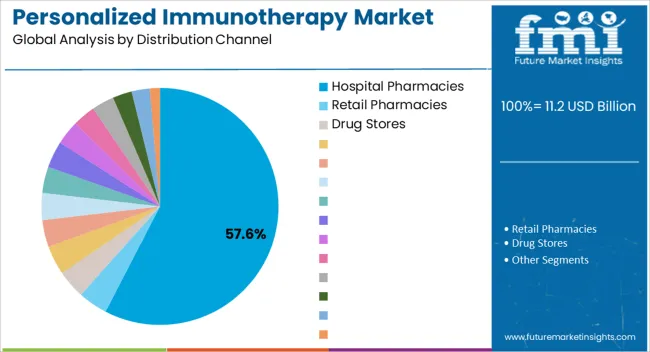
The Hospital Pharmacies distribution channel segment is anticipated to hold 57.60% of the Personalized Immunotherapy market revenue in 2025, establishing it as the leading distribution channel. This dominance is being attributed to the controlled and highly regulated nature of hospital pharmacy environments, which ensures proper storage, handling, and administration of complex immunotherapeutic agents. Hospital pharmacies provide centralized management of therapy dispensing, allowing for integration with patient treatment plans and clinical monitoring systems.
The growth of this segment has been supported by hospitals’ increasing investment in oncology and specialty care services, along with expanded infrastructure to accommodate advanced therapies. Additionally, hospital pharmacies offer trained personnel capable of managing biologic therapies and administering them under strict clinical protocols, which is critical for patient safety.
The segment has benefited from partnerships between therapy developers and healthcare institutions that streamline supply chains and enhance accessibility As personalized immunotherapy adoption expands, hospital pharmacies are expected to continue serving as the primary distribution channel, facilitating safe and effective delivery of these therapies.
Personalized immunotherapy is a biologic treatment for different type of cancer. Personalized immunotherapy boost the natural body defence system time to overcome with the cancer. Personalized immunotherapy uses the substance which are made up of human body or prepared in the laboratory to improve or restore the immune system of body. Personalized immunotherapy target to restore the immune system of human body to combat the cancer cell.
Immune checkpoint blockade through anti-PD-1, PD-L1, and CTLA-4 inhibitors are the key substances which are used during the personalized immunotherapy. The most common used drugs for the personalized immunotherapy is Ipilimumab, Nivolumab, Pembrolizumab, Atezolizumab, Avelumab, and Durvalumab. Personalized immunotherapy is mostly used to treat the leukaemia, non-melanoma cancer, and more recently to treat mid-stage lung cancer. Only7 fraction of people are expected to show dramatic side effect after the personalized immunotherapy for treatment of cancer.
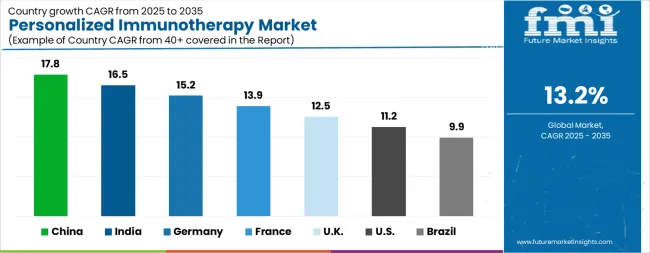
| Country | CAGR |
|---|---|
| China | 17.8% |
| India | 16.5% |
| Germany | 15.2% |
| France | 13.9% |
| UK | 12.5% |
| USA | 11.2% |
| Brazil | 9.9% |
The Personalized Immunotherapy Market is expected to register a CAGR of 13.2% during the forecast period, exhibiting varied country level momentum. China leads with the highest CAGR of 17.8%, followed by India at 16.5%. Developed markets such as Germany, France, and the UK continue to expand steadily, while the USA is likely to grow at consistent rates. Brazil posts the lowest CAGR at 9.9%, yet still underscores a broadly positive trajectory for the global Personalized Immunotherapy Market. In 2024, Germany held a dominant revenue in the Western Europe market and is expected to grow with a CAGR of 15.2%. The USAPersonalized Immunotherapy Market is estimated to be valued at USD 4.2 billion in 2025 and is anticipated to reach a valuation of USD 12.1 billion by 2035. Sales are projected to rise at a CAGR of 11.2% over the forecast period between 2025 and 2035. While Japan and South Korea markets are estimated to be valued at USD 502.8 million and USD 373.4 million respectively in 2025.
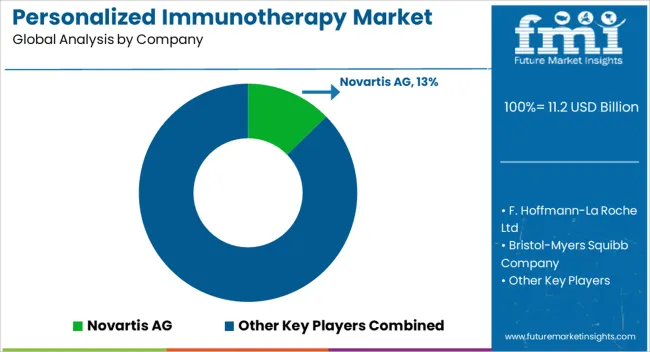
| Item | Value |
|---|---|
| Quantitative Units | USD 11.2 Billion |
| Therapy Type | Monoclonal Antibodies, Non-Specific Immunotherapies, Cytokines, T-Cell Therapy, and Cancer Vaccines |
| Application | Breast Cancer, Prostate Cancer, Brain Cancer, Leukemia, and Others |
| Distribution Channel | Hospital Pharmacies, Retail Pharmacies, and Drug Stores |
| Regions Covered | North America, Europe, Asia-Pacific, Latin America, Middle East & Africa |
| Country Covered | United States, Canada, Germany, France, United Kingdom, China, Japan, India, Brazil, South Africa |
| Key Companies Profiled | Novartis AG, F. Hoffmann-La Roche Ltd, Bristol-Myers Squibb Company, Merck & Co., Inc., Pfizer Inc., Gilead Sciences, Inc., Amgen Inc., Johnson & Johnson, AstraZeneca plc, GlaxoSmithKline plc, Sanofi S.A., Eli Lilly and Company, Bluebird Bio, Inc., Adaptimmune Therapeutics plc, Kite Pharma (a Gilead Company), Cellectis S.A., and Autolus Therapeutics plc |
The global personalized immunotherapy market is estimated to be valued at USD 11.2 billion in 2025.
The market size for the personalized immunotherapy market is projected to reach USD 38.6 billion by 2035.
The personalized immunotherapy market is expected to grow at a 13.2% CAGR between 2025 and 2035.
The key product types in personalized immunotherapy market are monoclonal antibodies, non-specific immunotherapies, cytokines, t-cell therapy and cancer vaccines.
In terms of application, breast cancer segment to command 41.5% share in the personalized immunotherapy market in 2025.






Our Research Products

The "Full Research Suite" delivers actionable market intel, deep dives on markets or technologies, so clients act faster, cut risk, and unlock growth.

The Leaderboard benchmarks and ranks top vendors, classifying them as Established Leaders, Leading Challengers, or Disruptors & Challengers.

Locates where complements amplify value and substitutes erode it, forecasting net impact by horizon

We deliver granular, decision-grade intel: market sizing, 5-year forecasts, pricing, adoption, usage, revenue, and operational KPIs—plus competitor tracking, regulation, and value chains—across 60 countries broadly.

Spot the shifts before they hit your P&L. We track inflection points, adoption curves, pricing moves, and ecosystem plays to show where demand is heading, why it is changing, and what to do next across high-growth markets and disruptive tech

Real-time reads of user behavior. We track shifting priorities, perceptions of today’s and next-gen services, and provider experience, then pace how fast tech moves from trial to adoption, blending buyer, consumer, and channel inputs with social signals (#WhySwitch, #UX).

Partner with our analyst team to build a custom report designed around your business priorities. From analysing market trends to assessing competitors or crafting bespoke datasets, we tailor insights to your needs.
Supplier Intelligence
Discovery & Profiling
Capacity & Footprint
Performance & Risk
Compliance & Governance
Commercial Readiness
Who Supplies Whom
Scorecards & Shortlists
Playbooks & Docs
Category Intelligence
Definition & Scope
Demand & Use Cases
Cost Drivers
Market Structure
Supply Chain Map
Trade & Policy
Operating Norms
Deliverables
Buyer Intelligence
Account Basics
Spend & Scope
Procurement Model
Vendor Requirements
Terms & Policies
Entry Strategy
Pain Points & Triggers
Outputs
Pricing Analysis
Benchmarks
Trends
Should-Cost
Indexation
Landed Cost
Commercial Terms
Deliverables
Brand Analysis
Positioning & Value Prop
Share & Presence
Customer Evidence
Go-to-Market
Digital & Reputation
Compliance & Trust
KPIs & Gaps
Outputs
Full Research Suite comprises of:
Market outlook & trends analysis
Interviews & case studies
Strategic recommendations
Vendor profiles & capabilities analysis
5-year forecasts
8 regions and 60+ country-level data splits
Market segment data splits
12 months of continuous data updates
DELIVERED AS:
PDF EXCEL ONLINE
Personalized Packaging Market Size and Share Forecast Outlook 2025 to 2035
Personalized Toys Market Size and Share Forecast Outlook 2025 to 2035
Personalized Nutrition Market - Size, Share, and Forecast Outlook 2025 to 2035
Personalized Beauty Devices Market Trends - Growth & Forecast 2025 to 2035
Personalized Bakery Products Market Analysis by Product Type, Price Range, Sales Channel, End-User and Region 2025 to 2035
Personalized Medicine Market is segmented by Personalized Medicine Diagnostics, Medicine Therapeutics, and Medical Care from 2025 to 2035
Personalized Home Decor Market Insights & Forecast 2024-2034
Personalized Skincare Serum Market Trends – Demand & Forecast 2024-2034
Personalized Orthopaedic Implant Market
Hyper-Personalized Fitness Market Insights & Forecast 2025-2035
3D-Printed Personalized Masks Market Size and Share Forecast Outlook 2025 to 2035
Radioimmunotherapy Treatment Market
Allergy Immunotherapy Market Analysis - Size, Share & Forecast 2025 to 2035
Market Share Breakdown of Allergy Immunotherapy Providers
Food Allergy Immunotherapy Market Analysis Size and Share Forecast Outlook 2025 to 2035

Thank you!
You will receive an email from our Business Development Manager. Please be sure to check your SPAM/JUNK folder too.
Chat With
MaRIA